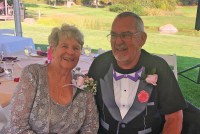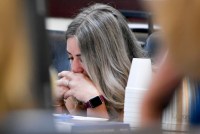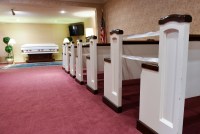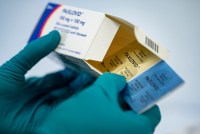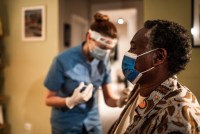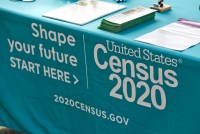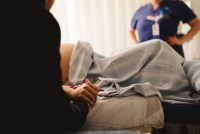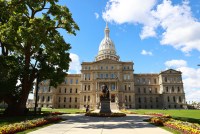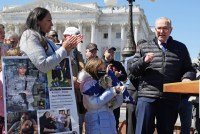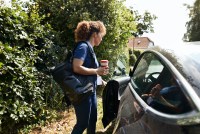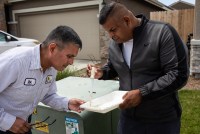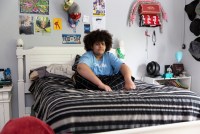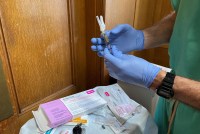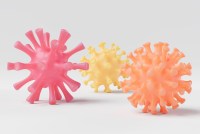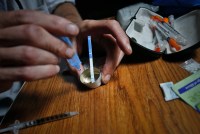Latest KFF Health News Stories
After the Pandemic Hit Nursing Homes Hard, California Lawmakers Push to Tighten Licensing Rules
Legislators are proposing an overhaul of California’s licensing system for nursing homes that would make it the most stringent in the country. They argue that disreputable and unlicensed owners and operators have harmed residents. The industry describes the proposed requirements as excessive.
No Prison Time for Tennessee Nurse Convicted of Fatal Drug Error
Hundreds of nurses gathered outside a Nashville courthouse to protest RaDonda Vaught’s prosecution for a medical mistake, and cheered when her probation sentence was announced.
Few Eligible Families Have Applied for Government Help to Pay for Covid Funerals
The Federal Emergency Management Agency will reimburse many families up to $9,000 in funeral expenses for loved ones who died of covid-19. But fewer than half of eligible families have applied, while others have run into application problems.
Should You Worry About Data From Your Period-Tracking App Being Used Against You?
After a leaked Supreme Court draft opinion was published May 2 suggesting that Roe v. Wade would soon be overturned, social media users started worrying that their use of period-tracking apps could lead to trouble if they sought an abortion and lived in a state with strict limits or bans on the procedure.
KHN’s ‘What the Health?’: The Invisible Pandemic
Covid cases are again climbing, but you wouldn’t know it from the behavior of public health and elected officials, much less the general public, all of whom seem to want to put the pandemic in the rearview mirror. Meanwhile, the fallout over the leaked Supreme Court draft opinion on abortion continues even as the Senate fails — again — to muster the votes to write abortion rights into law. Joanne Kenen of the Johns Hopkins Bloomberg School of Public Health and Politico, Alice Miranda Ollstein of Politico, and Sandhya Raman of CQ Roll Call join KHN’s Julie Rovner to discuss these issues and more. Plus, for extra credit, the panelists suggest their favorite health policy stories of the week they think you should read, too.
Is Paxlovid, the Covid Pill, Reaching Those Who Most Need It? The Government Won’t Say
Many public health workers are unable to see how many doses of Pfizer’s antiviral treatment are shipped to their communities and cannot tell whether vulnerable residents are filling prescriptions as often as their wealthier neighbors.
Why Won’t More Older Americans Get Their Covid Booster?
Approximately 1 in 3 Americans 65 and older who completed their initial vaccination round still have not received a first booster shot. The numbers dismay researchers, who say the lag has cost tens of thousands of lives.
Census Undercount Threatens Federal Food and Health Programs on Reservations
The 2020 census undercounted people living on Native American reservations. The money for many needed federal aid programs is tied to those population numbers.
Ripple Effects of Abortion Restrictions Confuse Care for Miscarriages
In Texas, where anyone can face a hefty fine of at least $10,000 if they abet an abortion, medical professionals on the front lines face tough quandaries when treating patients who have a miscarriage, a scenario that could soon play out around the country if abortion restrictions tighten.
1931 State Law Makes Abortion a Felony if ‘Roe’ Falls, Warns Michigan Attorney General
Dana Nessel, the Democratic attorney general of Michigan, said she would not have the authority to keep county prosecutors from enforcing the old law. Nessel also discussed the “selective reduction” abortion she had when pregnant with triplets.
Senate GOP Puts Up Roadblocks to Bipartisan House Bill for Veterans’ Burn Pit Care
The Senate could start work this week on a bipartisan bill to make it much easier for veterans to get health care and benefits if they get sick from exposure to massive, open-air incineration pits in war zones. The legislation has gained minimal support among Senate Republicans, who say they are concerned about the cost and the ability of Veterans Affairs to handle such a large new mission.
Travel Nurses See Swift Change of Fortunes as Covid Money Runs Dry
Travel nurse contracts that were plentiful and paid the temporary nurses far more than hospital staff nurses are vanishing. Hospitals nationwide are turning their energies to recruiting full-time people.
Rural California Hatches Plan for Engineered Mosquitoes to Battle Stealthy Predator
Tulare County officials hope the region will soon be a testing ground for a new generation of technology in a centuries-old war: Human vs. Mosquito.
National Addiction Treatment Locator Has Outdated Data and Other Critical Flaws
Three years after a government site launched to connect Americans to treatment, finding addiction care is still a struggle.
The Families of Trans Kids in Texas Consider Their Options Amid Crackdown on Care
After Texas limited transgender medical care for young people, patients are trying to figure out what’s next.
Can a Monthly Injection Be the Key to Curbing Addiction? These Experts Say Yes
In California, where overdose deaths are on the rise, physicians say administering anti-addiction medication as a monthly injection holds tremendous potential. So, why aren’t more patients getting it?
A Guide to Help You Keep Up With the Omicron Subvariants
How different are the seemingly endless stream of emerging omicron subvariants from one another and how protected are we?
Sweeping, Limited, or No Powers at All? What’s at Stake in the Mask Mandate Appeal
Dictionaries, public comments, and even an old court case that involved underwear pricing could play a role as the government appeals a ruling that sharply limits federal authority during pandemics.
KHN’s ‘What the Health?’: Leaked Abortion Opinion Rocks Washington’s World
The unprecedented early leak of a Supreme Court draft opinion that would overturn the landmark abortion-rights ruling Roe v. Wade has heated the national abortion debate to boiling. Meanwhile, the FDA, after years of consideration, moves to ban menthol flavors in cigarettes and cigars. Joanne Kenen of the Johns Hopkins Bloomberg School of Public Health and Politico, Shefali Luthra of the 19th, and Jessie Hellmann of CQ Roll Call join KHN’s Julie Rovner to discuss these issues and more. Plus, Rovner interviews KHN’s Paula Andalo, who wrote the latest KHN-NPR “Bill of the Month” episode about a family whose medical debt drove them to seek care south of the border.
As Overdoses Soar, More States Decriminalize Fentanyl Testing Strips
Georgia may soon join a growing list of states decriminalizing the use of fentanyl testing strips. Bans of the strips — on the books in about half of states, experts say — stem from laws criminalizing drug paraphernalia adopted decades ago. But the testing devices are now recommended to help prevent overdose deaths.



